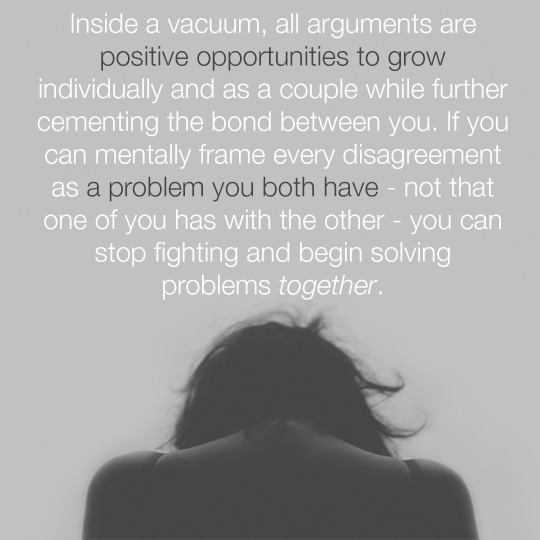If you’re trying to win, you’ve already lost.
When it comes to long-term relationships, arguments are a bit of an inevitability. No matter how well you get on, how much you have in common or how much you love each other, you will argue. A lot. At length. Sometimes very loudly. If you put two people together for long enough, they’ll find something to argue about.
In fact, in a lot of ways, arguments in a relationship are a good thing. Arguments suggest passion; they show that you each care enough about what the other thinks or says or does to get worked up about it, to become furious. The alternative is that you simply don’t care enough to argue with each other, and apathy is rarely part of a successful relationship. Of course, constant arguments in a relationship aren’t much better than none at all, but there’s definitely a happy middle ground to be found.
“Arguments have such a bad rep. Actually, they can bring you closer together,” reminds therapist Dr. Nancy Irwin. “This is why make-up sex is so great.” She isn’t the only expert trying to move away from the view that arguments are always a sign of trouble between partners. “Conflict in the context of a relationship is not only normal but also healthy,” agrees clinical psychologist Dr. Hillary Goldsher. “It is inevitable that issues arise that require resolution when two people have an intimate connection. The question is not if conflicts are going to occur, but how to handle them when they do.”
What a lot of people underestimate is that arguing is a skill. No, not winning arguments – that’s a different issue, and you’re not going to get very far in relationships if you worry about winning arguments. Instead, the skill that you need to worry about is managing arguments: when and where they happen, how to end them, how to pause them and pick them up at another time, and, perhaps most importantly, how to concede an argument even when you *know* you’re right. Yup, I’m afraid sometimes you’re just going to have to swallow your pride and admit defeat even when you’re in the right. If that prospect hurts, just remember that your partner is doing the same for you every now and then too.
Timing is Success
Not only is knowing how to have an argument important but also when to have the argument can make the difference between a happy ending and a miserable night on the couch. Long day at work? Under a lot of stress and pressure? Busy involved with other things? About to go to bed? About to leave for work? Trying to resolve an argument at the wrong time can lead to less than desirable results. “Partners who pay attention to how the other is responding and when they are most receptive to productive conversations, often have better outcomes when they are selective about their timing when broaching tough topics,” notes Dr. Bethany Simmons, professor of marital and family therapy. Couples who make time for conversation and important topics on a regular basis (daily, weekly, etc.) communicate to their partner that they are important and willing to flesh out the difficult aspects of their relationship. Sometimes planning your arguments is not always possible, so here is what to do if the timing is off…
Lead It Home
There are few sights that attract more simultaneous public sympathy and annoyance than a couple having a rather private argument in a rather public place. No one wants to air their dirty laundry in public, but that’s exactly what tends to happen when couples feud out of the house. This causes more problems than simple embarrassment, however. Arguments in front of prying eyes make it harder for either side to back down and apologize, for fear of losing face. That means a public argument is more likely to go on and on, past the point when the two of you should have been able to make amends.

Unfortunately, it’s hard to guarantee that an argument will never start while you’re out of the house, especially if you’re at a restaurant, bar or party and the drinks are flowing. Tempers can flare at any time – what counts isn’t stopping arguments from starting, but controlling them once they do. With that in mind, if you realize that tension is rising when you’re out in public, try to calmly but firmly suggest that you both agree to leave the topic be until the end of the night, or the next time you’ll be by yourselves. Things may remain tense between the two of you, but you’ll avoid causing a scene – and the extra time might give you both the chance to cool off.
That’s the approach recommended by psychotherapist Dr. Tina B. Tessina.“Disagreements always require two people,” she argues. “If you don’t participate, your partner can’t argue without you. If the issue arises at an inopportune time, you can just find a temporary resolution (agree to delay the discussion, go home, leave the restaurant) and wait until things calm down to discuss what happened.”
However, be careful not to just dismiss your partner or their concerns. Attempting to stop an argument by disengaging from them could actually escalate things further if you communicate the message to them that you don’t care about what they are upset about or that you are deciding for both of you when and where you will discuss these concerns, or if it is the end of the discussion altogether. Be sure to let them know their concerns and opinions are important to you – even if you don’t agree with them. They will also be more likely to be respectful of your view in return. One way to do this might be to say something like, “It seems like we really see this differently and your opinion matters to me. Would you be willing to discuss this when we get home so that I can really focus on what you’re saying?”
If that doesn’t work, and one or both of you won’t be able to let this one wait, you need to be prepared to duck out of the situation immediately, even if you’d rather not. That may mean heading home, or it may simply require finding somewhere quiet to hash things out and (hopefully) clear the air. Just remember, sitting in the middle of a restaurant bickering (or worse, screaming) across the table is not likely to lead to a quick resolution. Get alone somewhere, and deal with it in private. If nothing else, you’re probably doing a favor to everyone else around you.
Word of warning: telling someone to calm down or stop yelling, walking away without agreeing as a couple you will take a break from the argument, or getting defensive almost always escalate arguments.
Create Distance to Encourage Reflection
When you’re in the middle of an argument with someone, no matter how small the subject, it’s hard to keep a level head when you’re in the same room as them. Every glance at one another will likely just help to fuel the irritation you’re feeling. Even if you’re not still talking about the argument, just being around each other can slow down the process of resolving things.
In the overwhelming majority of relationship arguments, both parties are at fault to some extent – even if it doesn’t seem that way at the time. Really resolving an argument requires you both to accept whatever you’ve said or done wrong, so that you understand the other’s position, and getting time to yourself can help speed things up. The next time you’re in an argument that doesn’t look like it’ll let up anytime soon, try and get away from each other – in a respectful way of course. Once on your own, force yourself to calm down, and do your best to really assess the situation – both what you’re annoyed about, and what you think your partner is too.
If an argument is getting more and more heated, “it may make sense to take a time out. Literally step away from each other. Take a walk, go to the next room and think about how you want to show up in your relationship,” agrees Dr. Goldsher. Is this how you want to treat each other in your relationship? “Give yourself an opportunity to get grounded and emotionally contained and return for a continuation of the discussion once you have gathered yourself.”
More often than not, a bit of time away from them will give you the chance to cool down and appreciate their point of view, without the need to keep up an angry front. Just be sure to come back together to come to an agreement (even if that is agreeing to disagree) if this is an important issue to either one of you. Knowing when to not revisit arguments is important too (someone was just in a particularly bad mood that day) and not waiting until the next argument to bring the last argument up can save you from more arguments in the future.
There’s No Shame in Surrender
It’s very easy to think of any argument, even within a couple, as a competition, where winning or being right can seem more important than, y’know, just getting on with one another. One of the toughest lessons to learn in a long term relationship is that winning an argument is a pretty empty victory if it leaves the two of you feuding and bitter, or ruins what could have been a great night together. Sometimes it’s better to just take one for the team and concede the argument for the sake of salvaging your evening and getting the chance to enjoy each other’s company again. “Remember you are ‘on the same team’,” suggests psychotherapist Sharon Martin. “The goal is not to ‘win’ the argument. The goal is a resolution in a way that is respectful and meets both of your needs.”
Now, this advice comes with a few caveats. First, giving up the argument means giving it up for good. This isn’t a chance to pretend they’re right, make nice and come at them with full force later on. If you’re going to tell them they’re right, you’ve got to stick to it. Second, don’t let yourself get bitter about it. Don’t fall into the trap of thinking you’re giving in “to shut them up” or anything similar – instead, you’re making a (small) sacrifice to keep things harmonious. And odds are, they’re doing it for you every now and then too. You didn’t think you really won that argument about why Furious 7 was the perfect date movie, did you?
Can’t concede, but want to end the argument? Empathy can do wonders. Telling your partner, “I hear what you’re saying,” “I can see you’re point,” or “I understand why this really upsets you…” can take an argument from 90 to 0, without having to necessarily give in.
Finally, pick and choose your fights. Some arguments are too important to just give in on, and you need to settle them one way or another. That means anything that will have a lasting impact on your relationship, home or personal lives. It’s one thing to give in and let her pick where you go for dinner even though she got to the last three times, it’s another to just let her have her way entirely when it comes to where you’re going to live or where your relationship boundaries lie. That doesn’t mean you should get your way either – the big stuff needs to be settled amicably and mutually, one way or another. Which is how we come to…
Learn to Compromise, Like, Actually Compromise
It almost seems too obvious to be worth saying, but the real key to peacefully resolving any argument between you and your partner is compromise. From both of you. Think about it – without compromise, one of two things happens. Either the argument goes on forever, which sounds legitimately hellish, or one of you winds up not getting any of what they wanted. That’s alright sometimes, but it’s not always possible, especially for the really big life-affecting decisions I mentioned in the last section.
Compromise is “one of the critical tenets of conflict resolution,” agrees Dr. Goldsher. “The solution has to be about the good of the couple, not just the individual. Decide on areas where you can live with less than you expected or wanted. Compromise breeds good will and promotes reciprocal compromise.”
Whether it’s decorating your shared house or just making your weekend plans, the best outcome is always going to be one that leaves both of you happy. Inevitably though, assuming the pair of you don’t have magically identical preferences on all things (in which case, why are you dating your clone?) you can’t both have everything you want. That means you need to figure out what you’re prepared to give up on, and what you aren’t.
Whatever the topic, figure out your deal breakers. If you’re decorating and pink walls in the bedroom are non-negotiable, then make that clear, while offering a concession that you can live with – which art goes on the walls, maybe. What matters is figuring out what really matters to you, which is easier said than done in the heat of the moment. When angry, you’re likely to put a lot of weight on things that might seem less important in the light of day, as your real priorities get lost in the mix of the argument. Take a step back, figure out what really matters to you, and be prepared to make concessions on the things that don’t.
“Make sure you are clear on other areas where you need to stand up for a particular change in the relationship,” Dr. Goldsher continues. “Drawing boundaries around issues where you need and require change also helps unveil the sustainability of a relationship long term. If your partner can bend and shift in areas that are deal breakers for you, that is a good sign in terms of your mutual ability to navigate life together as a couple. If there is consistent inflexibility, it may be a sign that the relationship is not a viable option for the future.”

Own Up to Your Mistakes
We’re only human, so sometimes it is hard to admit when we are wrong (or see another person’s side of things if we really think we’re right). If you actually (like really) listen to what your partner is upset about without ego, you might find that they’re right. The things our partners get upset about are often of our ignorance, not malice, and self-reflection can help us see that. Pride can often make the difference between a happy and successful relationship and one full of contention and disagreement. Being willing to admit when you are wrong or have wrongfully treated your partner can bring you closer together and usually, they are then more willing to do the same with you.
At the end of the day, arguments are hard to get right. No matter your intentions, no matter how well you think you can manage them, once tempers are flared a lot of that careful planning tends to go out of the window. That’s OK – and inevitable, at least some of the time – just be ready to make up the next day. But by remembering to move arguments somewhere private, take time apart to cool off, concede when necessary and compromise when possible, hopefully, that’ll happen less and less often. The only downside? You’ll be missing out on all that makeup sex.



